Do I Need A Binocular Harness?
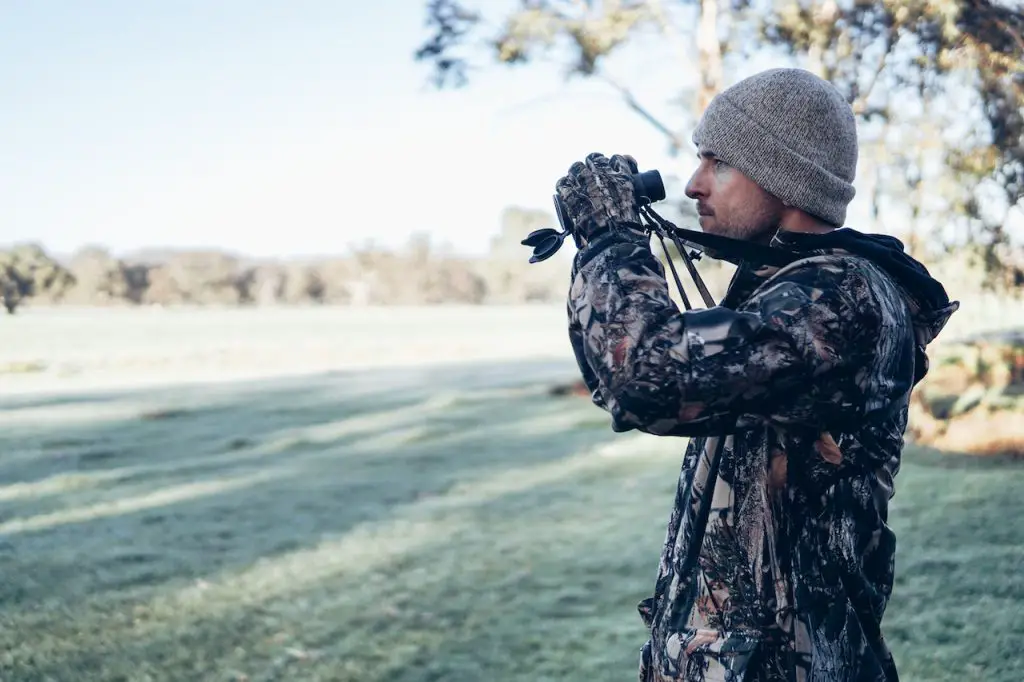
When it comes to enhancing your outdoor adventures and making the most of your binoculars, a key consideration is whether to invest in a binocular harness.
Let’s first quickly see what is a binoculars harness and why it was introduced in the market.
Binoculars Harness and Its Purpose
A binocular harness is a specialized carrying system designed to secure and distribute the weight of your binoculars across your body.
It typically consists of adjustable straps that are worn over your shoulders and around your torso.
The harness connects to your binoculars, allowing them to hang comfortably at chest level.
This setup provides several benefits, including reducing strain on your neck and shoulders, keeping your binoculars easily accessible, and preventing accidental drops or damage.
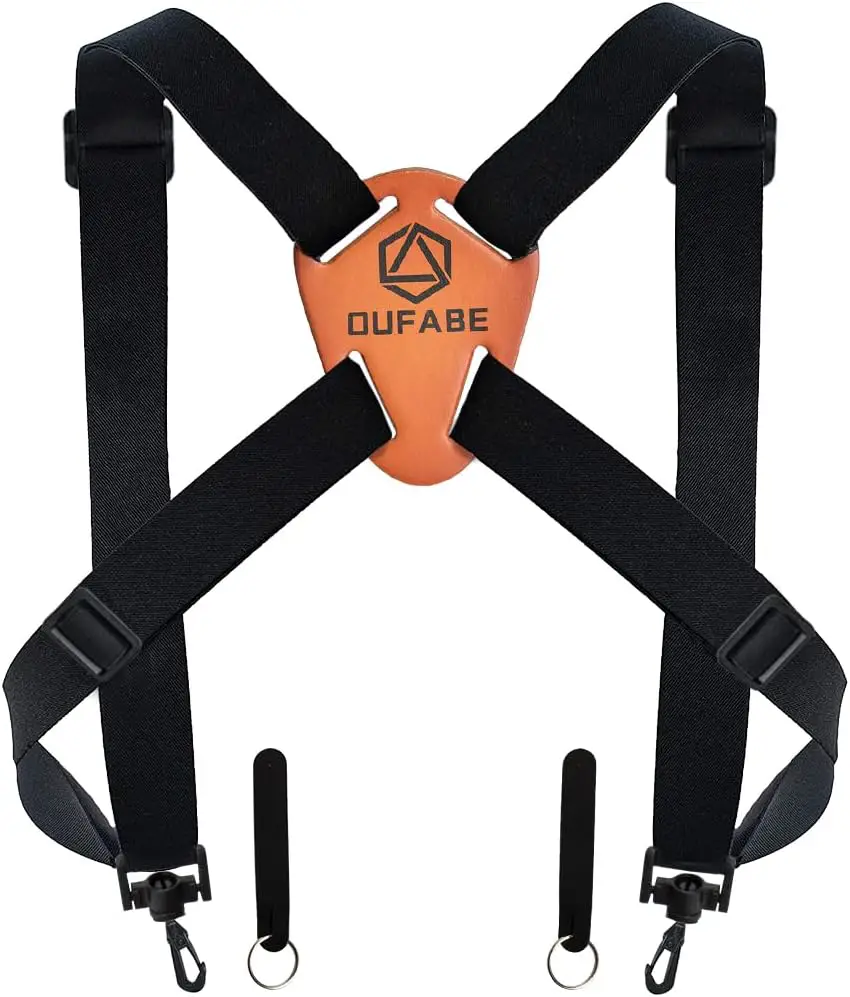
Why Choose a Binocular Harness?
Imagine having both hands free to handle other gear, take notes, or simply navigate through challenging terrain while your binoculars remain within easy reach.
So, First and foremost, a binocular harness ensures that you’re always ready to sneak a peek at your surroundings without missing a beat.
Let’s discuss my point in detail:
Do I Need A Binocular Harness?
Deciding whether to invest in a binoculars harness depends on various factors that revolve around your outdoor activities, preferences, and comfort.
Consider the nature of your outings – are you frequently engaged in activities that demand prolonged use of binoculars, such as birdwatching or wildlife tracking?
Do you often find yourself struggling to keep your binoculars steady or having to adjust a neck strap? Are you concerned about neck strain or discomfort after extended use?
Also, the weight and size of your binoculars also play a role.
Heavier or larger binoculars can exert more strain on your neck and shoulders over time, making a harness a valuable accessory.
Additionally, your physical condition and any existing neck or back issues should be taken into account when deciding whether a harness is necessary to enhance your comfort and enjoyment.
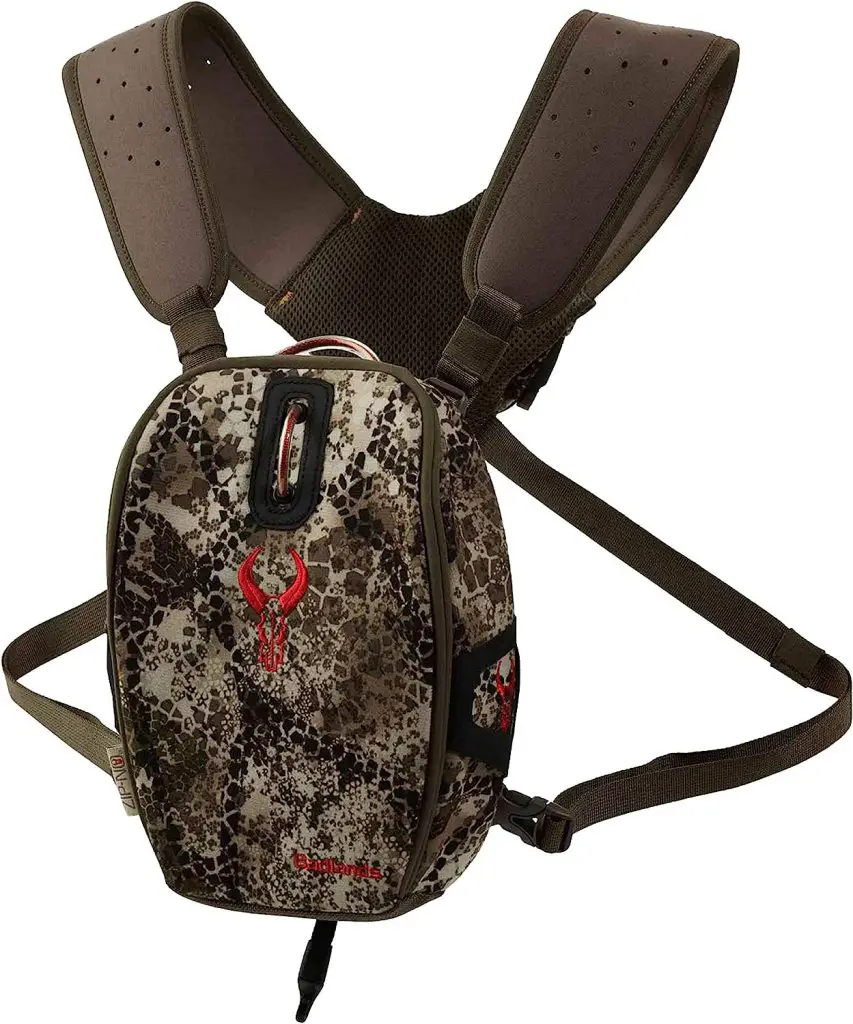
So, How A Harness Can Help?
Unlike the hassle of unzipping a bag, removing lens caps, and unsheathing your optics, a harness allows you to swiftly grab your binoculars and start observing within seconds.
Flighty wildlife won’t escape your view as you can quickly seize those moments.
Moreover, the proximity of your binoculars to your body offers an added layer of personal security.
Given the investment you’ve made, protecting them from damage against branches or rocky surfaces is vital.
Plus, it decreases the likelihood of falling victim to opportunistic theft.
When your binoculars are securely strapped to your chest, a thief would have to contend with you to even think about snatching them.
Protection and Convenience
Accidental drops and damage are every binocular owner’s nightmare. With a binoculars harness, the risk of dropping your valuable optical instrument is significantly reduced.
The harness holds your binoculars securely against your body, minimizing the chances of them slipping out of your hands or off your neck.
This added layer of protection is particularly beneficial in situations where you might be navigating through rough terrain, climbing, or participating in activities that involve movement and motion.
Whether you’re birdwatching in a forest or trekking through a rocky landscape, the harness acts as a safety net, ensuring your binoculars remain safe and intact.
Relief from Neck Fatigue
Frequent binocular users often complain about neck fatigue from wearing them like a necklace.
As binoculars can grow heavy quickly, taking care of your neck is essential.
A harness redistributes the strain to your shoulders, which can better handle the fatigue. This separation of weight across both shoulders eases the load on your neck.
Versatility and Comfort
Harnesses offer diverse wearing options, accommodating your comfort preferences.
Unlike traditional neck straps that concentrate the weight on your neck, a harness spreads the load across your shoulders and chest.
This balanced weight distribution helps to alleviate strain and discomfort, particularly during prolonged periods of use.
Whether you’re moving on a birdwatching expedition or a scenic hike, the harness minimizes the risk of neck fatigue, allowing you to focus solely on your surroundings.
Situations Where a Binoculars Harness Is Beneficial
While a binocular harness offers a multitude of advantages, its true value shines in specific scenarios and activities where comfort, convenience, and safety play a pivotal role.
Let’s explore these situations in more detail:
Long-Duration Wildlife Observation
For wildlife enthusiasts and birdwatchers, patient observation is a necessity.
During long hours spent waiting for the perfect glimpse of elusive creatures, comfort becomes paramount.
This is where a binoculars harness truly excels. Whether you’re perched in a hide or standing in an observation spot, the harness’s even weight distribution prevents neck strain and allows you to maintain focus without experiencing discomfort.
By securely holding your binoculars close to your body, the harness enables you to seamlessly transition from observing one subject to another, all while keeping your hands free.
Hiking, Birdwatching, and Other Active Outdoor Pursuits
When engaging in dynamic outdoor activities such as hiking or birdwatching, the last thing you want is for your binoculars to hinder your movement.
A harness ensures that your binoculars stay in place and remain accessible as you navigate uneven terrains, climb hills, or move through dense foliage.
This hands-free advantage allows you to use trekking poles, hold onto handrails, or even use your camera without having to worry about readjusting your binoculars repeatedly.
With a harness, you can fully immerse yourself in the experience and capture every moment without interruptions.
People with Neck or Back Issues Seeking Comfort and Support
Individuals with neck, shoulder, or back issues often find traditional binocular neck straps uncomfortable or even painful.
A binoculars harness can provide a much-needed solution by distributing the weight across the upper body, alleviating strain on sensitive areas.
Whether you’re dealing with chronic pain or temporary discomfort, a harness can offer the necessary support and relief, enabling you to enjoy your outdoor activities without compromising your well-being.
By identifying these specific situations, you can better understand the contexts in which a binoculars harness can make a significant difference.
Instances Where a Binocular Harness May Not Be Necessary
While a binocular harness offers numerous advantages, there are situations where its use may not be as essential.
1. Continuous Walking, No Crawling
If your outdoor activities predominantly involve walking and do not require crawling or intense movement, a traditional strap could suffice.
In scenarios where you don’t anticipate frequent movements that could jostle your binoculars, a harness might not be a must-have.
2. Hunting from Treestands or High-Seats
For hunters who prefer treestands or high-seats, a binocular harness might not be as crucial.
These scenarios often involve a stationary position and minimal movement, making a regular strap suitable for carrying binoculars without compromising comfort.
Case Type Harness and Suspender Type Harness: Some Of My Observations
While the market offers numerous harness varieties, this discussion will focus on two of the most commonly used types in binocular harnesses: the case type and the suspender type.
1. Case-Type Harness
Case-type harnesses, like the Vortex Glasspak, provide a protective housing for your binoculars.
While they offer security and organization, they do have certain drawbacks.
Retrieving the binoculars from the case can take a bit longer, potentially causing you to miss swift opportunities, such as spotting a bird or butterfly.
However, these harnesses often feature nonelastic straps that offer long-lasting durability. With proper construction, they can endure for up to twenty years.
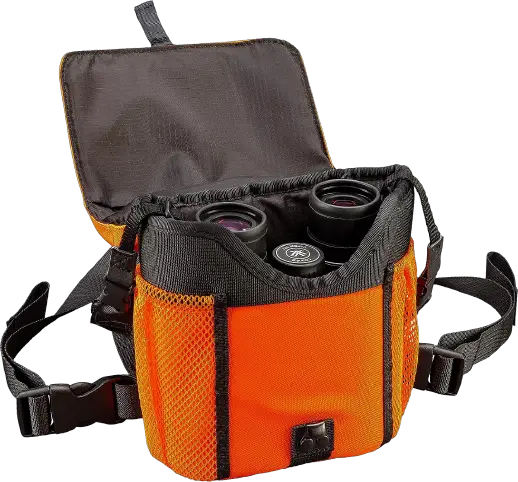
Advantages:
- Protective storage for binoculars
- Durable nonelastic straps
- Long-lasting if well-made
- Organized storage solution
Disadvantages:
- Slightly slower access to binoculars
- May miss quick observation opportunities
2. Suspender-Type Harness
Suspender-type harnesses, such as the Vortex or Qufabe Binocular Harness strap, prioritize quick access to your binoculars.
These harnesses eliminate the delay in bringing the binoculars to your eyes, making them ideal for fast-paced wildlife observation.
However, most suspender-type harnesses use elastic strapping, which can stretch out over time, necessitating replacement every two years or so.
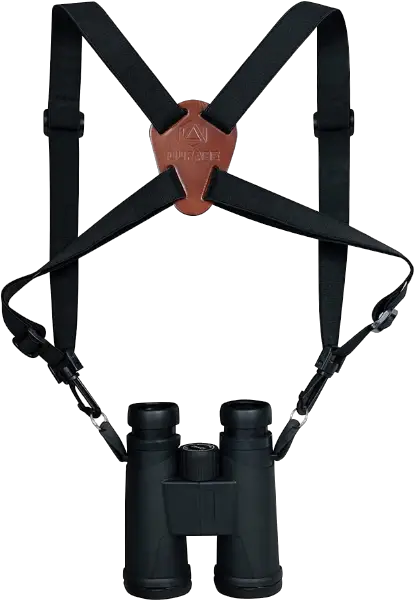
Advantages:
- Rapid access to binoculars
- Well-suited for quick observations
- Convenient and user-friendly
Disadvantages:
- Elastic strapping can stretch out
- Frequent need for replacement
Finding the Best of Both Worlds
The dilemma posed by these two harness types prompts a question: why not combine the benefits of both?
Imagine a harness that utilizes nonelastic straps to secure the binoculars in place and employs elastic material solely to facilitate quick movement to and from your eyes.
This ingenious solution would provide both the speediness of suspender-type harnesses and the durability of case-type harnesses.
If you value quick access and convenience, a suspender-type harness might be your choice.
On the other hand, if durability and long-term use are paramount, a well-constructed case-type harness might suit you better.
Alternatives to Binoculars Harnesses
While binoculars harnesses offer an excellent solution for distributing weight and enhancing comfort, there are also alternative methods to carry your binoculars that cater to different preferences and needs.
Exploring these alternatives can help you find the perfect balance between comfort, mobility, and functionality.
Neck Straps and Their Pros and Cons
Neck straps are a common and straightforward option for carrying binoculars.
They attach to the binoculars’ lug and are worn around the neck, allowing the binoculars to rest comfortably on your chest when not in use.
Neck straps are simple to use and can work well for individuals who prefer minimal equipment.
However, they may not be suitable for prolonged use, as they can put strain on the neck and cause discomfort during extended activities.
Neck straps also lack the hands-free convenience that harnesses provide.
Also Read: Binoculars Strap or Harness
An Interesting Helpful Video
Conclusion on Whether You Need a Binoculars Harness or Not
If you frequently participate in activities that involve prolonged observation, such as birdwatching, wildlife spotting, or hiking, a harness can provide unparalleled comfort and convenience.
It distributes the weight of the binoculars evenly across your body, reduces strain, and keeps your hands free for other tasks.
On the other hand, if your activities are more sporadic or involve quick movements, alternative carrying methods like neck straps or attachable clips might be more suitable.
Imagine having both hands free to handle other gear, take notes, or simply navigate through challenging terrain while your binoculars remain within easy reach.
A harness offers this hands-free convenience by securely holding your binoculars close to your chest.
This is particularly advantageous for activities that require frequent transitioning between binocular use and other tasks, such as jotting down observations or capturing photographs.
The harness eliminates the need to constantly adjust a neck strap and ensures that your binoculars stay comfortably in place, leaving you unhindered to fully immerse yourself in your outdoor pursuits.
